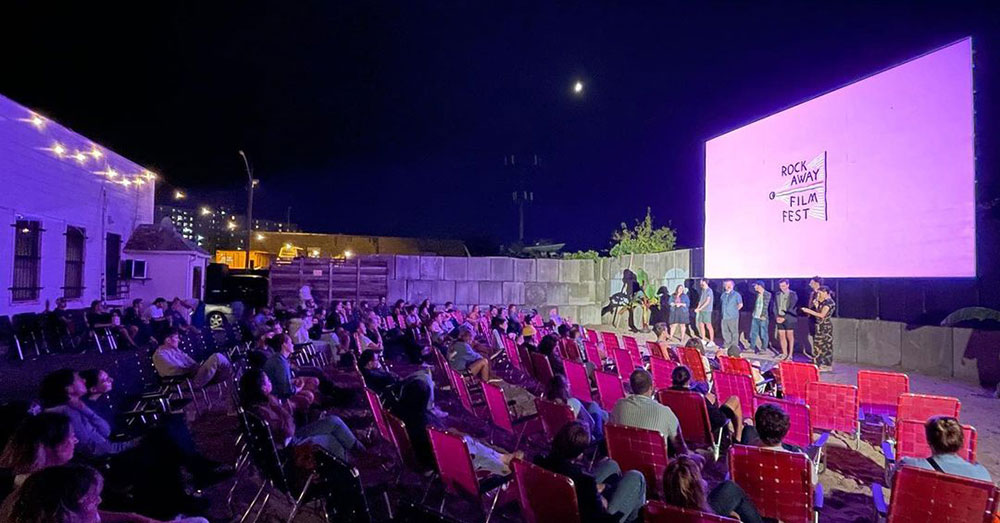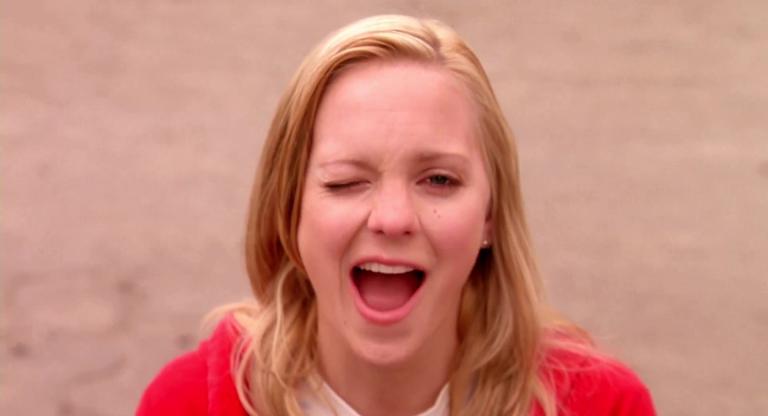The Rockaway Film Festival, now in its seventh year, launches this Saturday night at the outdoor Arverne Cinema, on the southern edge of Queens. This unique space, partially constructed from boardwalk planks destroyed by Hurricane Sandy in 2012, features a sand floor and a state-of-the-art sound system that was designed by Jorge Morillo—the associate manager of media arts at the Guggenheim and the technical director of the festival. Audiences gather in red and black plastic chairs, creating an atmosphere that is both casual and immersive.
The Rockaways once boasted nine movie palaces across the peninsula, with the last one, the Surfside Twin, closing in 1996. This piece of history is highlighted on the official RFF website, which is adorned with sepia-toned postcards that evoke the grandeur of these bygone theaters. Today, with its innovative programming and open-air venues, the RFF is putting forth a new culture of moviegoing in the area.
This year’s festival poster—a hand-stitched quilt of blue and green fabric scraps—captures the essence of the programming: a welcoming, unpretentious, and diverse celebration of the handmade and the personal. Curated by Courtney Muller and filmmaker Sam Fleischner, the lineup is a vivid tapestry of textures, genres, and color palettes, with a special emphasis on short films; it includes nine shorts programs altogether.
The festival opens with Wim Wenders’s intimate road movie Alice in the Cities (1974), celebrating its 50th anniversary, and closes with the painter Agnes Martin’s only completed film, Gabriel (1976), which will be accompanied by a live score from the Rockaway Chamber Music. Alongside these highlights, the selection includes a variety of films—from comedic narrative shorts, to experimental documentaries, to a program geared toward kids. Visual motifs like water and film grain give the wide-ranging films common textures. The result is a program unified by subtle yet discernible currents.
The festival celebrates low-budget and diaristic filmmaking, emphasizing filmmaking modes where the act of creation is as significant as the final product. Zia Anger’s My First Film (2024) is a fictionalized adaptation of her cult performance piece and dramatizes her experience making her first feature film in her twenties. My First Film embraces the awkwardness and vulnerability of the creative process, with Anger herself intervening to highlight the film’s rough edges. Similarly, in Report from Hollywood (1984), the cinematographer Ed Lachman pulls back the curtain on filmmaking and captures a harried Wim Wenders as he struggles to make The State of Things (1984), a film about Hollywood, with no script. Like Anger, he negotiates, begs, and fields unpleasant phone calls from people mad at him, but ultimately presses on.
In the shorts programming, there’s a similar emphasis on films that are rough-around-the-edges. In the short films from the Faith Hubley Centennial program, the artist’s vibrant hand-painted collaborations with her husband draw from mythology and indigenous art. Here, nearly every mark is visible—where the pen was lifted and stroked, and with how much force. In her short film Daisy (2024), the Venezuelan-Hungarian director Catalina Kulczar narrates the circumstances surrounding a family tragedy while intercutting footage from her therapeutic ocean swims and home videos. The cuts feel organic, rough, and casual—with digressions and interjections. In Bisagras (2024), a series of black-and-white, voyeuristic images of the residents of Dakar appear in rich, textured 16mm film. The final shot of the piece shows a digital camcorder on a tripod—a wink to the audience. The presence of the digital camera throws the film’s design into question—were all its rich, celluloid images simply a product of digital manipulation?
Sound and its capture is another prominent theme in the festival. The feature documentary As the Tide Comes In (2024) explores the lives of the 60 residents of Mandø, an island off Denmark's coast, where the specter of a devastating flood in 1634 still looms large. The residents each have their different ways of tracking changes in their environment and their own ways of looking for clues about whether another storm is approaching—there’s the birdwatcher, the storm tracker, and one man who uses special equipment to record the sounds of the island. In one scene, we see the .wav files pulled up as he describes the sound of each bird, each rustle in the soundscape. The Jordanian artist Oraib Toukan’s short Offing (2021) contrasts colorful images of nature and abandoned amusement parks with narration speaking to the hardships of the occupation. In the film, the Gaza-based artist Salman Nawati poignantly says, “Sound is the biggest weapon […] You cannot choose not to hear. No matter how much you cover your ears, sound enters your skull.”
Technology and how we understand ourselves through media is also heavily featured in the festival’s lineup. The approach to technology in the programs “ Pixel Portraits” and “Data Passenger” shifts from playful (Application to be Lars von Trier’s Female Girlfriend/Muse, 2024), to moody and atmospheric (Random Access, 2023), to cerebral (as in 2023’s Direction of the Road, an adaptation of an Ursula Le Guin short story made with 3D stereo-scoping). Just like cameras, sound equipment, and editing, algorithms and virtual worlds can become tools used to make self-portraits and process our innermost thoughts.
Water, a powerful and omnipresent force in many of the films, mirrors the festival's coastal setting and serves as a unifying theme throughout the selections. Alice in the Cities opens with a stark, grainy black-and-white shot of the empty Rockaway Beach boardwalk. Phillip, the protagonist, takes Polaroids of the rocky ocean landscape from under the boardwalk. The scene feels gloomy until Phillip (Rüdiger Vogler), with a self-aware smile, starts singing “Under the Boardwalk.” In As The Tide Comes, island dwellers articulate how the ocean's rhythms profoundly influence their lives, from sleep patterns to emotional states. Offing concludes with a poignant question that encapsulates humanity's deep connection to the sea: "If there was no sea, how would we live?" In the shorts block, “Harbor of Myth,” the ocean serves as a screen to project stories; we see commercial fishermen in Greece, children who play by the beach in Vietnam, and a dystopian future where scuba divers swim through the toxic waters of a flooded downtown Manhattan. This aquatic motif, reflecting the festival's beachside setting, where attendees feel the cool sand beneath their feet, creates a cohesive narrative that flows like the tides.
The Rockaway Film Festival runs from August 17-25 at the Arverne Cinema and the Annex Cinema.


